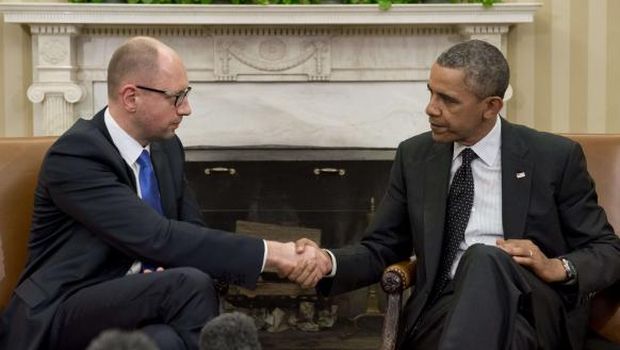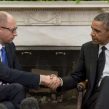
Ukraine’s Diplomatic Efforts to Gain Security in the Crimean Conflict
Publication: Eurasia Daily Monitor Volume: 11 Issue: 52
By:

The Russian Federal Assembly will probably recognize the official annexation of Ukraine’s Crimean peninsula in the coming days. Having essentially avoided armed resistance to the Russian operation to date, the interim Ukrainian government in Kyiv has instead embarked on intensive diplomatic efforts to de-escalate the crisis and prevent Russia’s invasion into mainland Ukraine. Though this may, of course, change in the next few days if Ukraine holds true to its pledge to militarily engage Russian troops if they do not abandon the Ukrainian naval base by Friday, March 21, that was overrun by pro-Russian forces on Wednesday (Kyiv Post, March 19).
Nonetheless, for now Ukraine has largely summoned Western diplomatic support, which may ultimately result in an interim “trade-off” outcome whereby Ukraine is free to sign the political portion of the Association Agreement with the European Union, while Russia refrains from further invasion and concentrates on its occupation of the Crimea. Should such a temporary compromise be reached, the two countries may take a pause before making subsequent major moves.
Despite President Vladimir Putin’s promise not to divide Ukraine further, which he expressed in his March 18 address to the Federal Assembly (https://eng.kremlin.ru/news/6889), a Russian intervention in the southeastern Ukrainian oblasts and even Kyiv cannot be excluded within the next 12 months. Realizing this danger, Ukrainian diplomats have been reaching out to the United Nations, the United States, the European Union, China as well as the member countries of the Commonwealth of Independent States (CIS) in order to attempt to contain the conflict to the Crimean peninsula and gain security assistance against the superior Russian Armed Forces. First and foremost, the government has been reminding all sides about the 1994 Budapest Memorandum on Security Assurances in which Russia, the United Kingdom and the US pledged to support the inviolability of Ukraine’s territorial integrity and pledged to refrain from using coercive economic measures against it (see EDM, March 10). On February 28, the Verkhovna Rada (Ukrainian parliament) demanded that the Memorandum’s signatories hold immediate consultations with Ukraine to ease tensions (Interfax-Ukraine). In fact, Ukraine had already started referring to the Budapest Memorandum as early as August 2013, after Russia launched a series of economic sanctions aimed at blocking Ukraine’s association process with the EU. At that point, Valeriy Chaly of the Razumkov Center acknowledged that by its sanctions, Russia was demonstrating that the Budapest memorandum “was not working” (https://zik.ua/ua/news/2013/08/20/425304).
Russia’s decision not to participate in the multi-lateral consultations on Crimea, which Ukraine called for on February 28, has seemingly prompted renewed debate in Ukraine on deterrence and raised questions about whether the country should re-consider its non-nuclear status. Provocatively, the former minister of foreign affairs Volodymyr Ohryzko wrote that in the absence of security guarantees, Ukraine should take steps to exit the Nuclear Non-Proliferation Treaty (NPT) and begin the process of rebuilding its nuclear arsenal as well as develop small- and medium-range missiles (https://blogs.pravda.com.ua/authors/ogrysko/531837d38ef17/). However, former defense minister and Ukrainian Security Service (SBU) head Volodymyr Marchuk quickly poured cold water on Ohryzko’s approach by arguing that a non-nuclear military conflict, especially a local one, is still possible between nuclear states (https://meridian.in.ua/news/12544.html).
Another renowned Ukrainian international relations expert, Ambassador Oleksandr Chaly, suggested that the Budapest Memorandum should be enhanced by a new binding agreement to be signed by the original signatories as well as two other security guarantors—China and France. Such an agreement, Chaly believes, should stipulate a neutrality status for Ukraine, which would also become part of the country’s new constitution (https://www.globalaffairs.ru/ukraine_crysis/Do-tochki-nevozvrata-16471).
Ambassador Chaly further recommended that Ukraine invoke the “collective self-defense” clause of Article 51 of the UN Charter and request that other UN member states jointly act to defend Ukraine’s sovereignty (https://www.globalaffairs.ru/ukraine_crysis/Do-tochki-nevozvrata-16471). Other Ukrainian media outlets indicate that Ukraine may indeed try to encourage international security assistance within this framework. The news portal Insider.ua noted that the Address to the UN, which the Verkhovna Rada adopted on March 13, included a clause to allow Ukraine to address any state with a direct request to protect its territorial integrity (https://www.theinsider.ua/politics/5322d8f4664cf/).
The Insider also quoted a Ukrainian diplomatic source who said that the country’s interim prime minister, Arseniy Yatseniuk, may have discussed with US President Barack Obama the possibility of developing for Ukraine an analogue of the US-Israel 1952 Mutual Defense Assistance Agreement. Such an agreement would allow Ukraine to procure US weapons and ammunition. Although the US has not yet provided Ukraine with direct military assistance, Washington might allow for this type of support should the crisis in Crimea escalate or spread to other parts of the country.
Finally, Ukraine has been seeking security assistance from the North Atlantic Treaty Organization (NATO). Ukraine and NATO have agreed to expand the Alliance’s ties to the Ukrainian political and military leadership, as well as work toward improving the readiness of the Ukrainian Armed Forces and expand Ukraine-NATO joint exercises (Interfax-Ukraine, March 17). Moreover, despite the rather thin possibility for international security assistance to Ukraine at present, a domestic debate over NATO membership has restarted. In particular, a draft bill on NATO membership, authored by Fatherland Deputies Borys Tarasiuk, Valentyn Koroluik and Oleksand Chornovolenko, was submitted to the Rada (Interfax, March 5). The leader of the UDAR party, Vitaliy Klichko, also came out in support of the draft bill (https://ukranews.com/ru/news/ukraine/2014/03/10/117452). For now, however, Ukraine’s Ministry of Foreign Affairs has officially stated that NATO membership is not government policy (https://tsn.ua/politika/u-mzs-zapevnyayut-scho-ukrayina-poki-ne-planuye-vstupati-do-nato-338956.html). Prime Minister Arseniy Yatseniuk echoed this position on March 18 by declaring, “The issue of NATO membership is not on the agenda to preserve Ukrainian integrity” (https://news.liga.net/video/politics/1027859-yatsenyuk_obratilsya_k_zhitelyam_yuga_i_vostoka_ukrainy_video_obrashcheniya.htm).
Despite all these efforts, the continued unfavorable international security situation around Ukraine creates the effect of a security vacuum (see EDM, March 11). This has frustrated some Ukrainian politicians and analysts, who have come to believe that the only viable method for resolving the crisis is through bilateral, or possible multilateral, negotiations between the great powers—negotiations to which Ukraine is often not a party. Illustratively, Insider.ua quoted Rada Deputy Speaker Ruslan Koshulynskiy, Svoboda as saying: “Nothing depends on us anymore. Everything is being decided without us at the level of Russia and the US” (https://www.theinsider.ua/politics/5322d8f4664cf/). Clearly, the Crimean crisis presents a challenge to seemingly increasingly fragile European security system. And the longer it remains unresolved or is allowed to escalate, the more likely it will be to transform the feelings of frustration and helplessness in Kyiv into perilous desperation.




